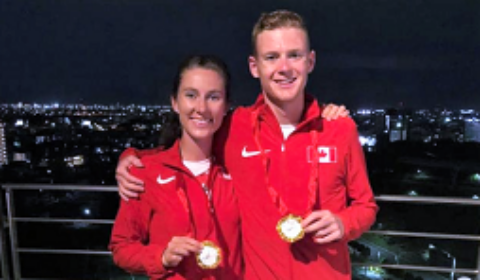‘YOU JUST HAVE TO PINCH YOURSELF THAT YOU’RE AT THE OLYMPICS’: NATALIA HAWTHORN
Mark Clairmont | MuskokaTODAY.com
GIFU, Japan — So close — yet so far … for now.
Bracebridge Olympian Natalia Hawthorn “dreamed” of being at Friday’s Olympic Opening Ceremonies to “celebrate and enjoy it.”
But like the rest of the world she watched here on a Japanese TV and wildly cheered the handful of her Canadian team-mates who marched into the National Stadium.
She was in a Gifu hotel — five hours inland from coastal Tokyo — where she is training for her first race next Sunday night Aug. 1 (ET) in the 1,500 metres.
And she was sporting as much red from her Team Canada red opening ceremonies outfit as she and her track team-mates could wear.
She was bursting with pride, her heart racing beneath the maple leaf in only the way adrenalin propels her around the track.
Not an unfamiliar sight — or feeling — for the 26-year-old who grew up in the Heart of Muskoka where she began a running journey that has taken her half way around the world to today.
Via her home now in North Vancouver, where she works with a software company that mixes and matches athletes, schools and scholarships.
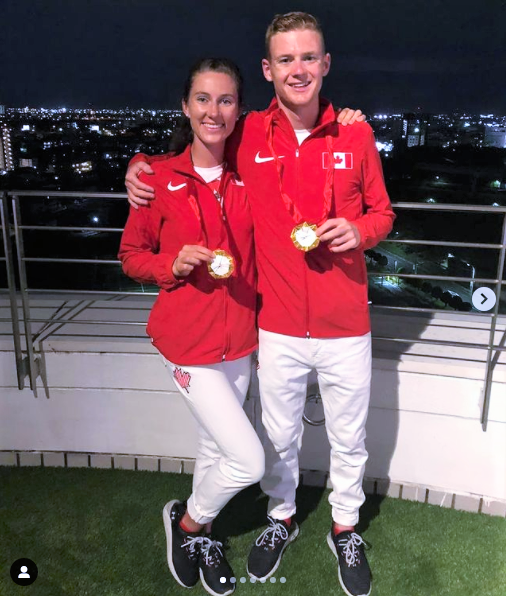
And it could all climax a week from tonight when she runs her first heat in the 1,500 metres — in that same stadium where she once dreamed of following her flag into Friday.
That is, of course, unless she crosses the finish line in one of three heats to advance to the semifinals Wednesday and — she hopes — and on to the finals and miraculously the podium two days later.
Speaking by WiFi from her Gifu (gee-foo) training camp the night before the opening, the mid-distance runner told MuskokaTODAY.com she’s “very excited.”
“It’s just been a surreal year with the whole journey and to just finally be here. And just try and hear all the support from friends and family from all the different places, like Vancouver, Bracebridge and Muskoka. It’s been so meaningful,” she said, adding she’d love to have her fiancé, family and friends with her and watching in the stands.
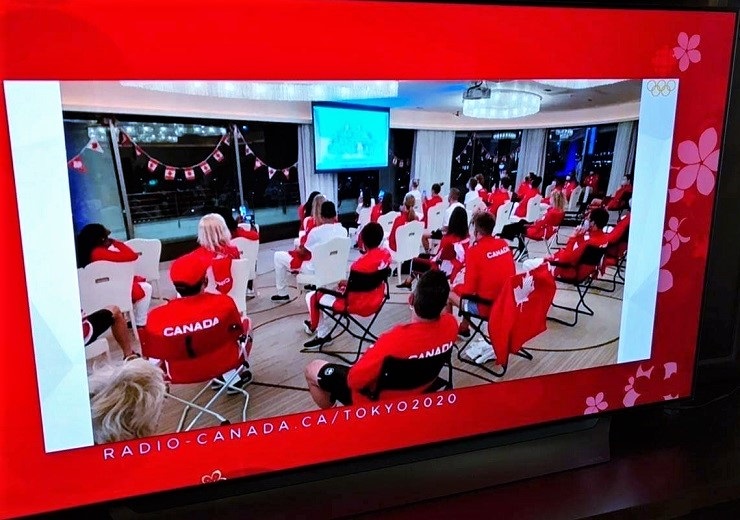
She said she’s not too concerned about running in an empty TV studio stadium save for athletes and officials.
She’s run a lot of races like that in her career and did run in more empty stadiums while qualifying this year due to the pandemic.
“The Olympics! It’s one race, that you know that’s a big exciting part of it. A huge stadium with tons of people cheering on is something that I have heard from a lot of people.
“It’s too bad there won’t be spectators. But all of us athletes have mentally prepared that no family or friends will be there and just realizing that with COVID you don’t really know what to expect. You just kind of got to roll with it and just mentally prepare for it. It’s just what it is. It doesn’t change the performance of it.
“You’re still going to have the athletes line up and at the end of the day it’s a race to see who can get to the end of the finish line first,” she says.
“I will say that when you get on that starting line, you’re in your own mind set. You hear the crowd but you’re really focused.”
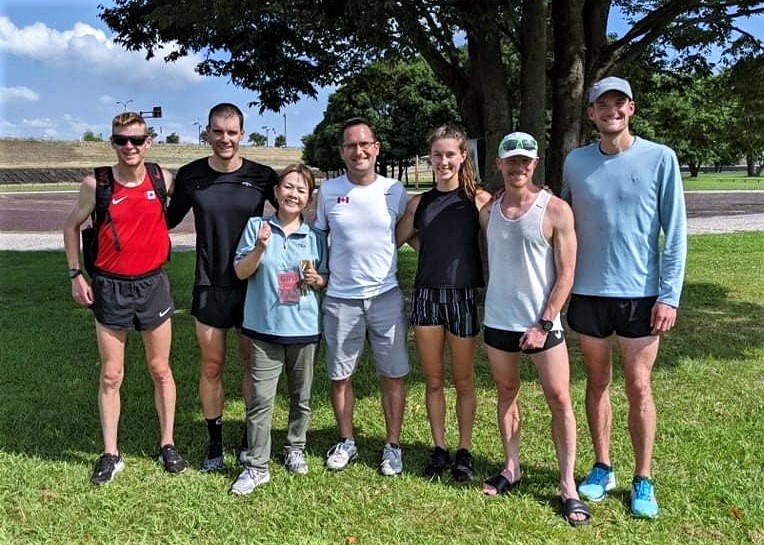
She added: “One positive way of looking at it is that I’ve done this tons of times. Just lining up and running around a track. And I guess knowing there won’t be those nerves” will make it a little easier.
But it is Olympics, so “it adds a lot of excitement.”
“One thing that will be important is to just pinch yourself that you’re at the Olympics.
“I don’t know what it will feel like,” without the crowd. “I’ll just have to wait to see when I’m there.”
“But just lining up with the best athletes in the world will be an experience in itself that I will really be looking forward to.”
Hawthorn said: “We’re working from a far,” but she’s there without her coach, Chris Johnson of UBC, whose paperwork didn’t go through to get him there.
So she is communicating with him from Canada and working with all the other Canadian coaches on various aspects of the games — mental, physical and social.
Due to the COVID state of emergency in Japan, Hawthorn is pretty much under quarantine most of the time.
She’s double vaccinated and hasn’t come across any other Canadians who aren’t, so she’s not worried about that.
She’s staying in a hotel across the street from a gym and an accessible practice track, which she can “literally see from my hotel room.”
Twice a day she can hop on a shuttle bus and be “chaperoned” to run on closed-off city park trails near the river away from any public. She just can’t go running around the city.
“We just continue our workouts and normal routines as we would at home.”
That includes two training sessions each day in the morning and afternoon.
“They’ve got it very organized to respect the citizens here, which I completely understand. And it’s good.”
In the Olympic Village, which she will move into on Wednesday, she said they will have a track where they can also train. She’s not sure if it will be in the stadium.”
Hawthorn, whose dentist father, Ken, was a Canadian national team cross-country skier, grew up in Bracebridge attending Monck Public School and BMLSS.
He said today the family is “really proud of her.”
And “now that she is going into the Olympic Village on July 28, we know it’s getting really close.
“Even parents get anxious.”
Through high school Hawthorn mostly ran the 1,500, winning Muskoka Parry Sound and Georgian Bay titles. And she competed at OFSSA, where she didn’t podium due to a lot of injuries, she said.
“In my Grade 12 year I qualified for my first national team. That was world junior cross-country.”
Her early successes earned her a track scholarship at UBC, where she studied kinesiology.
After graduating in 2018 she qualified for her first senior national team, which was again world cross-country.
After working to support herself financially out of university, she wanted to resume her running career.
To “pursue that” she “decided to re-evaluate and see what I can do in running.”
She started working part-time and “without any support from Athletics Canada — I wasn’t funded — and I just tried to run faster and improve my times.
“Then COVID hit, which obviously postponed the (2020) Olympics, which for me was a bit of a blessing in disguise. Because I was just continuing to progress throughout that. And I had breakthroughs in our time trials.
“So last year during the lockdown there weren’t any events. But our team and some of our athletes in the Vancouver area simulated track meets to see where our fitness was. Although they didn’t count I had breakthroughs and personal bests in various events and that instilled some confidence and showed that ‘OK, I’m capable of this. Let’s see what I can do.’”
In 2021 once things started to open in the spring when she was officially able to compete “that’s when I started to improve my times and it all kind of came together and I was able to meet the Olympic standard in both the 1,500 and 5K.
“And just made the Olympic team.”
Along the way in the past year she relocated her home base to Spokane, Wash., where her fiancé Coleman Allen’s family lived and she could train and compete more in the U.S.
Allen is a former national team member himself and like her works in software. He is her “pillar of support,” she says, and her biggest booster along with her family in Bracebridge.
“I was kind of flying under the radar a little bit, but things came together and I was able to qualify for my first Olympic team, which I’m really stoked about.”
She says: “One thing to mention is those time trials; although they didn’t count officially they caught the eye of Brooks, a running company that I worked for out of university after I quit my fulltime job to work part-time. And they saw my performances and were interested in helping support me. So this past January I got sponsored by Brooks, and that really helped provide me with opportunities to fly to competitions.”
Hawthorn says she has a salary with Brooks, but it doesn’t affect anything about amateur status or eligibility at theses Olympics where she says there are a ton of athletes who are sponsored.
“Fortunately it’s really been this past year where everything has come together and I’ve been healthy, have support and everything has aligned.”
Because COVID threw Canadian competitions off course, Hawthorn had to rely on her race times and rankings to qualify.
Which she did in May by just meeting the Olympic qualifying time of 4:04:20.
And was subsequently named to the team.
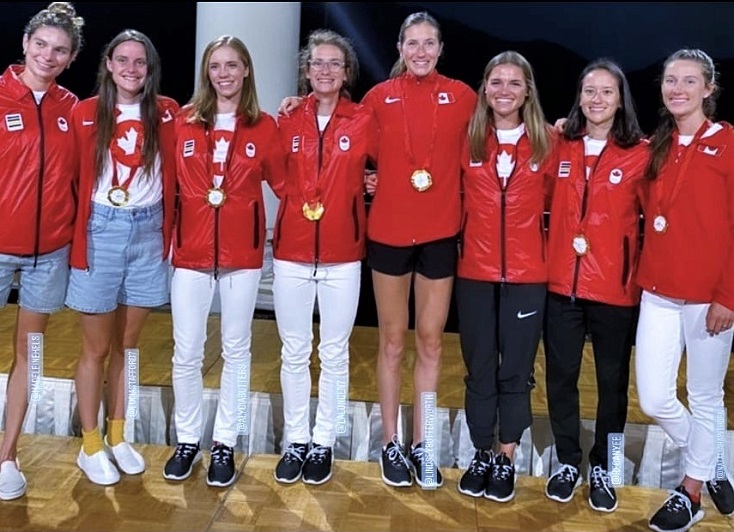
In high school Hawthorn’s best 1,500 was about 4:29. Her last season before COVID, in 2019, she ran 4:13. Since then she’s been able to knock off 9 more seconds.
On July 9 Olympic defending champion Faith Kipyegon, of Kenya, ran 3:51.07.
So Hawthorn has some ground to make up.
“With the first Olympics it’s great to learn and experience,” she says.
“But for me coming to my first Olympics. Although it’s my first Canadian track team that I have ever made, I’m really of the mindset that I’m here to perform and compete and do the best I can. So I’m obviously going to enjoy the experience.
“But I’m really coming in to this believing that I can move forward and that’s going to be the goal to make the final and just run every race the best I can and hopefully move forward. And just leave it all out there.”
She said the 1,500 can be a “tactical” race — “either slow, with a fast sprint or fast from the gun. You never know. Anything could happen.”
And what time will win in Tokyo?
“Sub 4 for sure. Very fast.”
She says there are a handful of women who have gone under 4 minutes and will be on the starting lines.
Canada’s top runner in this race is Gabriela Debues-Stafford, whose best time this year is 4 minutes. Her personal best is 3:56, which could stand her in medal contention.
Her younger sister Lucia Stafford is the third member of Canada’s 1,500 race team along with Hawthorn.
“I’m just embracing the whole thing,” Hawthorn said. “I’m just really happy to have been selected for this team. To be in a stable place both mentally and physically and just know that I’m the fittest I’ve ever been. I’m really excited to just go out there and take it all in and see how far I can push myself.
“Anything can happen in a 1,500. So tactics are a big thing. The first thing I will do is see who’s in my race to start with, ’cause that will give a nice idea. Because you know how certain athletes run and compete.”
She said she will talk with her coaches about various scenarios, but it just depends what happens in the race.”
Conceivably in her first heat Hawthorn could end up running next to Kipyegon.
“But at the end of the day, it’s just making those quick decisions within the race using your racing instincts.”
She says: “It’s been a great year so far ….”
And it may not be over yet.
Tune in to see next Sunday night at 8:30 p.m. for the first of the three televised heats.
Email news@muskokatoday.com
28 years of ‘Local Online Journalism’
Twitter: @muskokatoday, Facebook: mclairmont1
Leave comments at end of story
SUBSCRIBE for $25 by e-transferring to news@muskokatoday.com
Or go online to https://muskokatoday.com/subscriptions
